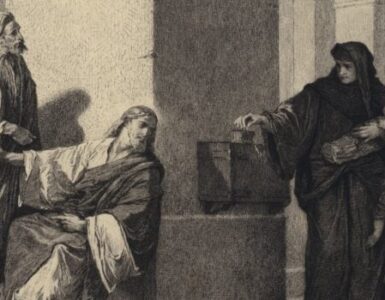Thirteen years ago, when I experienced my first miscarried baby there were not a lot of resources available. Families largely kept their grief private until someone found the courage to mention their losses. Today, thankfully, this topic is quite prevalent within the Church and resources are growing. I find myself—and others I know—in a similar situation when it comes to perimenopause and menopause. I hope sharing my own experiences will help women and men—husbands, sons, friends, co-workers, and priests–to understand a bit more about this part of women’s lives that can be deeply challenging spiritually, mentally, emotionally, and physically.
Long time readers know that I have suffered from debilitating hormone deficiencies for decades. This is what led to the loss of five babies. For a while I was able to find some relief through Natural Procreative Technologies (NaPro), even though I was not able to have anymore children with those treatments. When I was 36 years old, I had to end NaPro treatments when I developed a known side effect of painful, bleeding ovarian cysts from the HCG injections I took for multiple years. Shortly afterwards, I started perimenopause much earlier than most women, about 10 years early.
The dramatic shifts in my body for the last six years that are typical for women in perimenopause—which is the stage of hormone drops before menopause, which is 12 consecutive months without a period and the end of a woman’s reproductive years—are wreaking havoc on my body, emotions, and spiritual life. Chronic health issues have exacerbated, debilitating joint pain to such an extent that I can barely walk for up to a week at random times as hormones shift and then it disappears, extremely violent nightmares, random days of depression and anxiety, insomnia, weight gain, days when I feel like the Hulk and want to smash things, crying uncontrollably, and an inability to control my emotions. Many people reduce perimenopause to hot flashes, but I myself haven’t had hot flashes and instead have suffered a whole host of other issues.
Since I have been going through late perimenopause early, most of my friends are still having children. I am now 42 years old and coming towards the end of this roller coaster in the next year or so. I do know that there are countless women who are quietly suffering, as are their families, as they go through this natural, but difficult process. A friend recently told me that she’s started this process and she feels awful. There are days she and I both would like to lock ourselves away because we feel like crazy people. Perimenopause feels a lot like PMS all day every day for many women. I assured her and you, dear reader, that you are not crazy. It’s perimenopause.
It can be difficult in a society that tells women we must be like men—translated as not showing our emotions at all lest we be seen as weak–to talk honestly and openly about what women experience at this stage in their lives, even within the Church. I have had multiple priests—out of ignorance, not malice—misunderstand my emotional state and tears that I could not control no matter how much I wanted to. Given that priests often work with staffs dominated by women, understanding what women go through in their 40s and early 50s might help make sense of some of the more irrational days in the parish office. Husbands and sons usually get a front row seat, but may not fully understand what is happening to the women in their lives.
The health issues that can arise or be exacerbated during perimenopause can be extremely difficult on women and their families. This suffering is often kept to themselves. Since we live in a society that ignores the very real needs for women’s medicine in favor of birth control, our bodies are not well understood, so many women are simply left to suffer. Even so, this period of our lives can be a time of greater spiritual growth even if it feels like we are crawling up the holy mountain.
Growth in humility
As a woman who has tried to be reasoned, systematic, and logical, I have found the loss of control over my emotions to be one of the most difficult aspects of perimenopause. I often find myself crying uncontrollably over both large and small sufferings, which I am now learning to accept as a lesson in humility. It’s still a struggle to be sure, but those times when we are misunderstood by others or too hard on ourselves because we cannot get ahold of our emotions are an opportunity to unite ourselves to those times when Our Lord was misunderstood or unjustly accused by others. Our Lord bore those times with humility and love.
I also often think of Our Lady of Sorrows’ tears and unite mine to hers. No woman seeking holiness desires to be an emotional mess, but many women find themselves struggling with their emotions a great deal throughout perimenopause. There are plenteous opportunities to grow in humility, which is essential for progress in holiness.
Knowing this is happening to many women is also an opportunity for all of us to bear patiently and compassionately with those who are struggling a great deal during this period of their lives. It can be hard to understand in the moment, but hormones have a powerful impact on every aspect of a woman’s body and mind. Lord willing, our culture will truly seek to serve women in future generations and the Church will grow in a deeper understanding of sufferings that are particular to women and abandon the lies of our culture that women and men are the same.
Patient suffering
All of the spiritual masters talk about how essential it is to grow in patient suffering in order to progress in holiness. Perimenopause for some women can last 10 years, so this is not a quick process. I myself have been suffering these issues for about six years on top of dealing with decades of debilitating hormone issues. There are no quick solutions that will solve all of our perimenopause woes. NaPro has done wonders for countless Catholic women, but there are many of us who could only use the hormone treatments for a short time, so we are left to grow in patient suffering and union with Christ Crucified. I do recommend seeing a NaPro doctor about your perimenopause symptoms to see what options are available for you. No matter what, our suffering is never wasted and will be used by Our Lord for the sanctification of others, priests, and our own sanctification.
Surrender
On top of the physical challenges and emotional rollercoaster is the reality that perimenopause is a surrender of our bodies and womanhood to God. Part of the difficulty with this time in our lives is that we must surrender to the fact that we will no longer be able to have children once we reach menopause. This has been a long road of surrender, which I still battle, as I have not been able to have more than one child and have spent most of my married reproductive years losing babies.
This death to my own will and desires has been long, but in perimenopause it becomes true for all women. Once our cycle ends with menopause, we enter a new phase of our lives. Motherhood does not end, but it does mean we will no longer be able to bring natural children into this world. It’s a time of surrender. It’s also a time to consider more fully our God given vocation to be a spiritual mothers to those around us.
Our Blessed Mother can help us in surrendering throughout this period of our lives. Her life was a continual surrender to God’s plan. She surrendered Her only Son, the Son of God, all the way to His crucifixion. She can show us how to surrender our God given desires for natural children to His plan for our female bodies. This surrender can pave the way to new and beautiful ways of loving as Christ loves. It’s also an opportunity to surrender our sufferings to Christ’s sufferings on the Cross, which is always efficacious.
There is much that can be written on the topic of perimenopause and menopause. Every woman will go through this period in her life. Some will find it relatively easy, while others will suffer a great deal. Despite the unique challenges of this time in women’s lives, it can become an opportunity to grow in greater holiness and love. The same is true for those around us who must bear patiently with us as we ride what some days feels like an insane roller coaster.
May we draw closer to the Lord through Our Blessed Mother as we walk this natural part of being women and may those around us bear patiently on our difficult days and forgive our weaknesses and sins in the process.
Photo by John Kinnander on Unsplash












